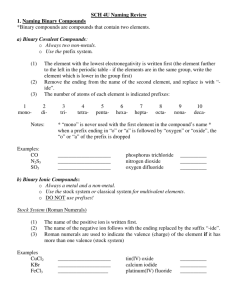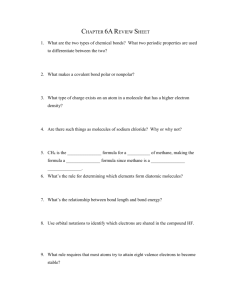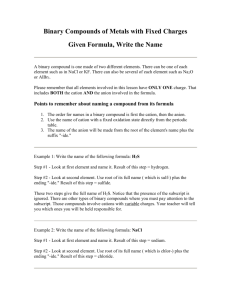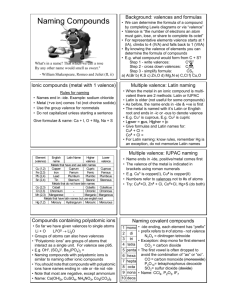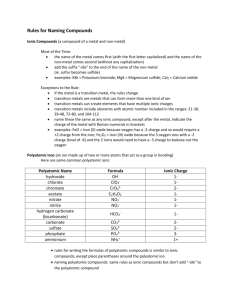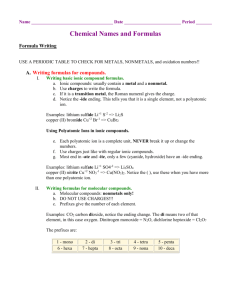Namining Compounds
advertisement
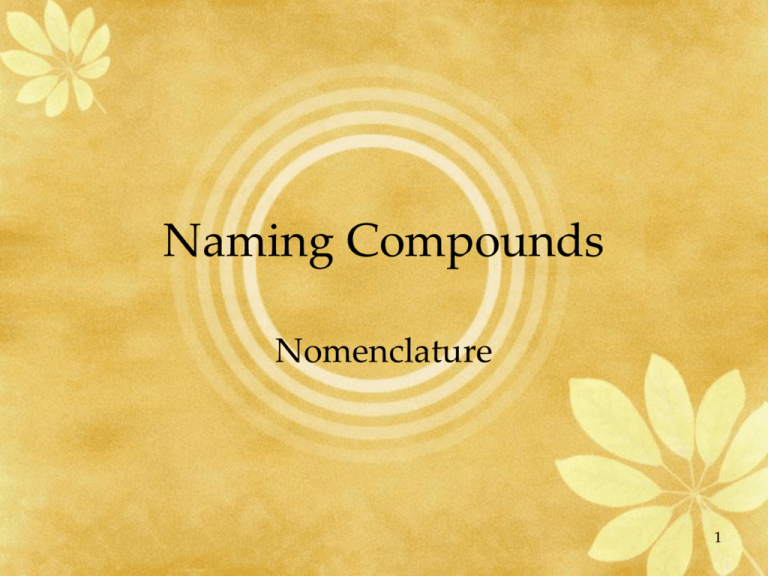
Naming Compounds Nomenclature 1 We know that… •The _____________ valence is written before the ____________ valence in a chemical formula. 2 And the name is… • NaCl • sodium chloride • AgBr3 • silver bromide • Al2O3 • aluminum oxide • BaS • barium sulfide • What type of substances are the first components in each the compounds? 3 Deducing the rules… • What ‘rule(s)’ are used to name each of the compounds? – Name the first element. – Name the second element, but modify to have an -ide ending. – AlBr3 Aluminum Bromide – BaO Barium Oxide 4 Now what do we do??? Cu2S CuS • Color(s): metallic luster, dark color usually charcoal gray or black, sometimes iridescent colors • Density 5.6 g/cm3 • Melting point1130 °C • Solubility: slightly soluble in HCl; soluble in NH4OH; dissolves in KCN • Color(s): Indigo blue (tarnished to purple or black • Density 4.6 g/cm3 • Melting point 103 °C • Solubility: in H2S 5 •Cu2S CuS • What is different about the first components in these compounds that was not the case in the compounds on the first page? • If the names are: • copper I sulfide and copper II sulfide • What is the rule that is used for compounds like this? 6 More than one positive valence… • If the first element is a metal that has more than one positive valences… – Name the first element. – Indicate the valence number of the metal in ROMAN NUMERALS – Name the second element, but modify to have an ide ending. – MnO • Manganese II oxide – SbBr3 • Antimony III bromide 7 What about compounds like these? • (NO) • (NO2) • (N2O) • (N2O3) • (N2O4) • (N2O5) • What type of substances are the first components in each the compounds? 8 If the correct names are… • (NO), nitrogen monoxide • (NO2), nitrogen dioxide • (N2O), dinitrogen monoxide • (N2O3), dinitrogen trioxide • (N2O4), dinitrogen tetroxide, or dinitrogen tetraoxide • (N2O5), dinitrogen pentoxide, or dinitrogen penatoxide What is the rule that is used here? 9 If the first element is a nonmetal • Use prefixes to indicate the number of each atom of each element in the compound. • Name the first element. • Name the second element, but modify to have an -ide ending. 10 PREFIXES • mono = one (optional on 1st element) • • • • di = two tri = three tetra = four penta = five hexa = six hepta = seven octa = eight ennea = nine deca = ten • P2O5 diphosphorous pentaoxide • AsO2 arsenic dioxide Remember your valence list is NOT all inclusive! • SF6 sulfur hexafluoride 11 What do we find here that we have not yet considered? • K3PO4 • • (NH4)2SO4 potassium phosphate • Ca(OH)2 calcium hydroxide • N2 (SO4)5 dinitrogen sulfate ammonium sulfate • What is the rule that is used here? 12 Polyatomic Ions • Use previous rules • Polyatomic Ions (Radicals) NEVER CHANGE THEIR NAME in any way! • Na2SO4 sodium sulfate • N2(CO3)5 dinitrogen carbonate • NH4Br ammonium bromide • Fe(NO3)2 iron II nitrate 13 If the first element is a… Metal 1 + valence • • • • • Name 1st element Name 2nd element w/ -ide ending Metal 2 + valences Name 1st element Charge in Roman numeral Name 2nd element w/ -ide ending NONmetals Prefixes Name 1st element Name 2nd element w/ -ide ending Polyatomic ions never change / modify their names. The first element in the compound determines how the compound will be named. Only one method of naming is used to name a compound. 14 More than one positive valence… …the old way • Traditional Method • Name the first element, but modify to include either an -ous or -ic suffix. • • • The HIGHER valence uses the -IC ending. The LOWER valence uses the -OUS ending. Name the nonmetal, but modify to have an -ide ending CoN cobaltic nitride Co3N2 cobaltous nitride 15 More than one positive valence… …the old way • Some elements will revert to using their Latin names for this purpose. Refer to your sheet of ‘Common Cations.’ • Cu2S cuprous sulfide • SnS2 stannic sulfide 16 If the first element is a… Metal 2 + valences Metal 1 + valence NONmetals Stock Traditional (new) (old) • • Name 1st element Name 2nd element w/ -ide ending Name 1st element Name 1st element Charge in Roman Add –ous (lower)or numeral -ic (higher) valence nd Name 2 element Name 2nd element w/ -ide ending w/ -ide ending • • • Polyatomic ions never change / modify their names. The first element in the compound determines how the compound will be named. Only one method of naming is used to name a compound. Prefixes Name 1st element Name 2nd element w/ -ide ending 17
